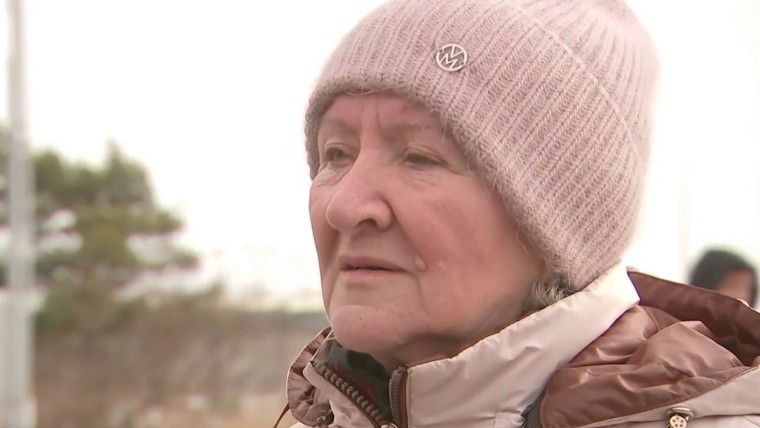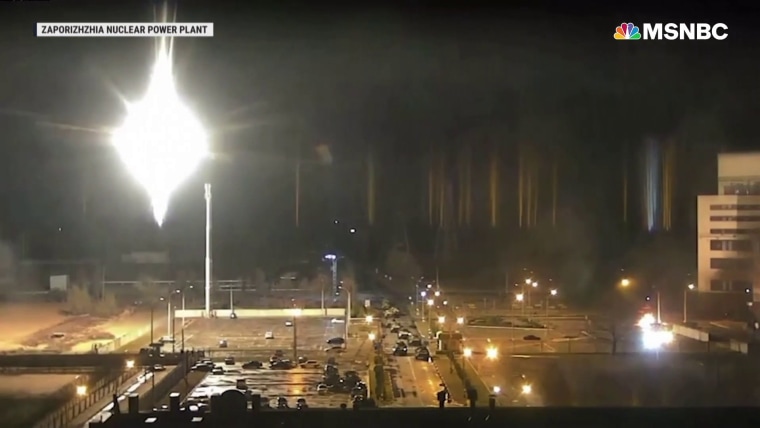I cry as I watch heartbreaking scenes of the people of Kyiv sheltering in subways under Russian President Vladimir Putin’s harsh attack. A burned at Europe’s largest nuclear plant on Friday as officials warned of catastrophic danger. Yet Moscow’s missiles raining down on the Ukrainian capital are a grim historical joke: The Russians are devastating the city that my great-grandfather, Soviet leader Nikita Khrushchev, lovingly rebuilt after the Nazis’ destructive occupation during World War II.
The Russians are devastating the city that my great-grandfather, Soviet leader Nikita Khrushchev, lovingly rebuilt.
Military analysts now talk about the Russian army’s laying siege to Kyiv. This is perverse — Putin knows well the horrors created by that military tactic. He is from St. Petersburg, which, as Leningrad, suffered through the Nazis’ ferocious, nearly 900-day siege. Roughly 1.5 million Russians died there, and the Soviet Union lost more than 20 million people fighting Adolf Hitler. Though Russia was a defender of Europe in that calamity, Putin has now turned his nation into one of the continent’s most ruthless threats.
The Russian president’s selective interpretation of the past reveals his historical obsessions. He wrote an extensive treatise last summer about why Ukrainians are essentially Russians — re-creating a favorite historical narrative of many Russian rulers, both czars and Soviets. He laid out why Ukraine — translated as the “Edge (of Russia)” and Malorossiya, or “Small Russia” — belongs to Moscow.
Relations between Moscow and Kyiv have traditionally been marked by serious frictions and hostilities. Ukrainians’ animosity toward Russia long predated 2014, when Putin annexed Crimea from Ukraine and backed, militarily and otherwise, the breakaway territories of Donetsk and Luhansk.
History shows that, across the centuries, Ukrainians have been trying to escape the control of a larger, dominant Russia. They fiercely sought to be free of Russian supremacy — even arguing that the founding of Kyiv, almost 400 years before Moscow, gives them the upper hand. You can see elements of this since the 880s, at the time of Kievan Rus, a proto-Slavic state for both Russians and Ukrainians. Consider that the Ukrainian poet Taras Shevchenko became a national hero in the 19th century as he extolled his people’s ardent desire for freedom.
Positioned between West and East, early Kyiv maintained a degree of independence under the princely Russian dynasty of the Ruriks through the 1300s. In the 1600s, the territory then known as Zaporizhian Sich, a semi-autonomous Cossack warrior polity, established a sort of “association” agreement with the Russian empire.
This continued until Czarina Catherine the Great decided she had had enough of the Zaporizhian Cossacks’ unruly disobedience and their proud independence. In 1775, she ordered the liquidation of the Sich, declaring the region officially part of the Novorossiya (territories to the Russian west). It is this Novorossiya that Putin seeks to re-create today — following the legacy of Catherine.
Since the 18th century, Moscow has treated Ukraine as a virtual colony, siphoning off its raw materials and grain to the central power. Yet the territory, once considered the breadbasket of the Soviet Union, was still able to maintain its separate language and culture. These traditions continued from the czarist regimes to the communists.
But under Soviet leader Josef Stalin in the early 1930s, the oppression of Ukraine reached a stunning level. To enforce farm collectivization, Stalin decreed that Ukraine had to give all private land and crops to the state. He wanted to ensure that Soviet workers would be fed during his all-hands-on-deck industrialization efforts.
The result was Holodomor — the Great Famine of the early 1930s — which claimed many millions of lives. This lethal failure made Ukrainians even more mistrustful of the Russians.
Before the end of that decade, however, Stalin sent Khrushchev to Kyiv to help revitalize Ukraine’s agriculture. My great-grandfather felt a strong kinship with the region. He had worked there as a miner in Donbas during the 1910s and often wore the brightly embroidered Ukrainian folk shirts. His wife, my great-grandmother Nina, was an ethnic Western Ukrainian and proud of it.
Yet curtailing Ukrainian national pride was always the Kremlin’s objective. Even while he was rebuilding the economy, Khrushchev was supposed to make sure that nationalism and anti-Soviet sentiment were kept at bay. In 1939, he oversaw the uneasy, and brutal, acquisition of Western Ukraine from Poland.
One document from that time, which I found in my family home, quotes my great-grandfather saying, “If we hung a few militant oppositionists in Lviv’s main square, others will be less tempted to rebel.” And this is from a man who genuinely liked Ukraine and helped it rise from the ashes after the war.
Svetlana Alexievich, the Nobel laureate in literature, who is half-Ukrainian, has often told me stories about the region’s strong animosity toward Russians. It was focused on, she recently explained, “not just your great-grandfather, but those with Ukrainian ties who succeeded him. Leonid Brezhnev and Mikhail Gorbachev would always put the center first. We chafed at their domineering power attitude.”
Today, that sense of superiority toward Ukrainians seems ingrained in the Russians.
In Russian, Ukrainians may colloquially, and often disdainfully, be referred to as “khokhol.” This term dates back to the times of the Zaporizhian Sich and roughly translates as a “tuft” — as in, it is believed, a long sidelock on a Cossack’s shaved head. Ukrainians, in turn, call Russians “moskal” — a derogatory term applied to the whole population of Russia, not just people from Moscow.
While growing up, I would often spend summers in Kyiv, visiting relatives there. I still remember being mocked for my perceived Moscow “superiority” — though I don’t think I displayed any. The fact that I was Russian was enough.
Today, that sense of superiority toward Ukrainians seems ingrained in the Russians. Putin stiffly gives orders to conduct a Ukrainian “special operation” (his euphemism for war) while seated alone at one end of a large white table. His entourage agrees from a distance, clustered around at the table’s other end, in a giant hall in the Kremlin. It looks too much like the times of Stalin.
Meanwhile Ukrainian President Volodymyr Zelenskyy, the former comic, unshaven in his military olive greens, is out and about with his team on Kyiv streets. He has more than met the moment as he shepherds his nation amid the deadly onslaught of its neighbor-turned-nemesis.
The imagery of these two men — like the images of Russian tanks on Ukraine’s roads and charred and shattered buildings in its cities — suggests that the millennium of the Russian sphere of influence over Ukraine has come to a tragic end.
Even if Putin succeeds in his imperial quest, Kievan Rus is forever lost to Russia. Ukrainians can never forgive us for such barbarity.
Source: | This article originally belongs to Nbcnews.com











